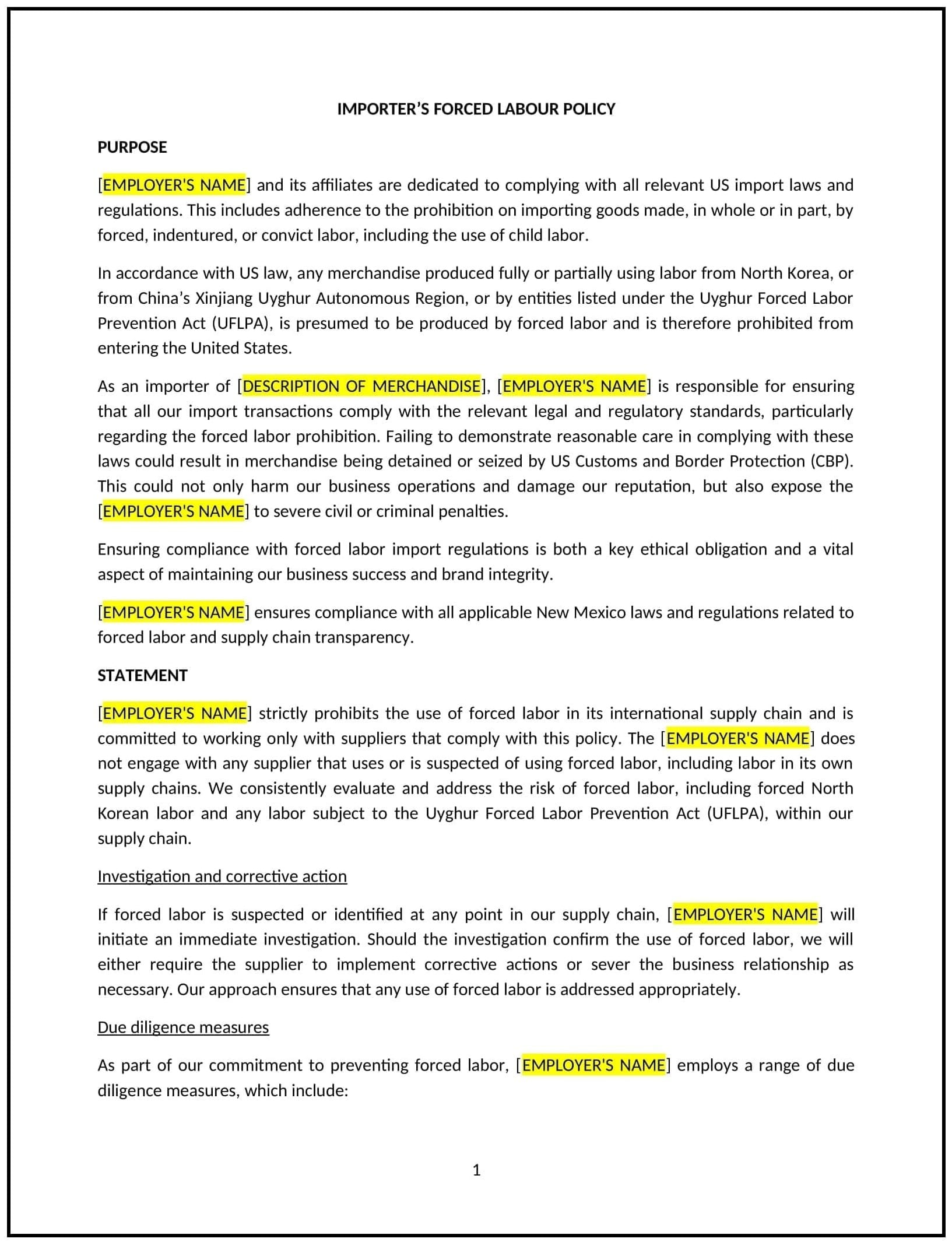Importer's forced labour policy (New Mexico): Free template
Got contracts to review? While you're here for policies, let Cobrief make contract review effortless—start your free review now.

Customize this template for free
Importer's forced labour policy (New Mexico)
This importer's forced labour policy is designed to help New Mexico businesses take a proactive stance against forced labour and human trafficking within their supply chains. The policy outlines the company’s commitment to ensuring that no forced labour is involved in the production, sourcing, or transport of goods and services. It includes clear guidelines for identifying, preventing, and addressing forced labour practices.
By adopting this policy, New Mexico businesses can reduce the risk of unknowingly sourcing products from forced labour, promote ethical sourcing practices, and protect the integrity of their supply chains while supporting compliance with relevant local and international laws.
How to use this importer's forced labour policy (New Mexico)
- Define forced labour: Clearly define what constitutes forced labour, including involuntary servitude, bonded labour, and human trafficking. Ensure that employees, suppliers, and other stakeholders understand the meaning and implications of forced labour.
- Establish due diligence practices: Outline how the business will assess its supply chains to identify any risks of forced labour. This may include supplier audits, self-assessment questionnaires, and third-party verification.
- Set expectations for suppliers: Establish clear expectations for suppliers, including requiring them to comply with the policy, undergo regular assessments, and maintain records demonstrating that their operations are free from forced labour.
- Implement corrective actions: Provide a framework for addressing any instances of forced labour identified within the supply chain, including terminating relationships with non-compliant suppliers and taking corrective actions.
- Reflect New Mexico-specific considerations: Address any state-specific laws in New Mexico that may apply to forced labour and human trafficking, including any local reporting or compliance requirements for businesses operating in the state.
Benefits of using this importer's forced labour policy (New Mexico)
Implementing this policy provides New Mexico businesses with several advantages:
- Protects business reputation: Taking a strong stance against forced labour helps protect the company’s reputation by demonstrating a commitment to ethical sourcing and responsible business practices.
- Reduces legal and regulatory risks: By proactively addressing forced labour, businesses can minimize the risk of legal penalties, fines, or reputational damage related to human trafficking or forced labour in their supply chains.
- Promotes ethical sourcing: The policy encourages businesses to ensure that their supply chains are free from exploitation, which aligns with ethical sourcing and corporate social responsibility goals.
- Increases consumer trust: Consumers are increasingly concerned about ethical sourcing, and businesses that demonstrate a commitment to eliminating forced labour are more likely to build trust with their customer base.
- Strengthens supplier relationships: Clear expectations around forced labour can strengthen supplier relationships by encouraging transparency and promoting compliance with ethical labour practices.
Tips for using this importer's forced labour policy (New Mexico)
- Communicate the policy clearly: Ensure that all employees, suppliers, and contractors are aware of the policy and its expectations. Include it in contracts with suppliers, training materials, and employee handbooks.
- Conduct regular audits: Regularly assess the supply chain for any potential forced labour risks. This can include conducting audits, inspecting supplier practices, and requiring suppliers to provide documentation demonstrating compliance.
- Foster a culture of transparency: Encourage open communication regarding forced labour concerns. Employees and suppliers should feel empowered to report any suspicions or incidents without fear of retaliation.
- Work with ethical suppliers: Partner with suppliers who share the company’s commitment to ethical practices. Businesses should build long-term relationships with suppliers who demonstrate transparency and a commitment to fair labour practices.
- Review the policy regularly: Periodically review and update the policy to ensure it reflects changes in New Mexico laws, international standards, and the company’s evolving supply chain needs.